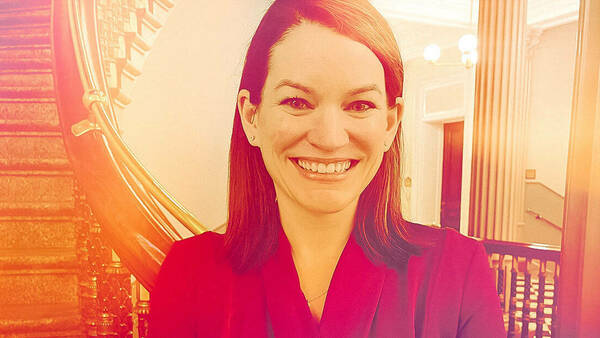When her sister-in-law, Joan, was diagnosed with pancreatic cancer in 1995, Patter Birsic ’77 felt powerless. At a time when the internet was still in its infancy, Birsic was unsure of what to do or how to find information.
“I don’t even know what search engine I used, but I went to look up pancreatic cancer and couldn’t find anything. I went to the American Cancer Society, and they list all these — I swear it was 40 different cancers — and I had to click on ‘other,’ and it was listed there,” Birsic says.
There was little accessible information about Joan’s diagnosis, despite pancreatic cancer being one of the leading causes of cancer deaths. Birsic speculates that because it was so often fatal, “nobody wanted to touch it.” The family wouldn’t find cause for optimism in Joan’s surgeon’s assessment of her prognosis either.
“Her surgeon at the time says, ‘You might as well just get everything in order, because she’ll be dead in six months.’ I mean, this woman was 38 with two little girls.”
But Joan’s family was far from ready to give up, and fortunately they had resources and knowledge on their side. Birsic’s brother-in-law, Bill Birsic ’82, who is a surgeon, researched clinical trials in hopes that an experimental treatment might give Joan a fighting chance. They found a trial at the National Institute of Health in Bethesda, Maryland, and Joan enrolled after acceptance by the NIH. As a result of the trial, her tumor shrunk enough that she became eligible for the Whipple, a procedure in which parts of the pancreas and sometimes nearby organs are removed.
However, despite her family’s best efforts, Joan passed away from pancreatic cancer in 1997. Joan’s loss was heartbreaking for Birsic. In the aftermath of the tragedy, as Birsic reflected on what her family had gone through, a thought nagged at her.
“Without Bill, nobody would have ever thought of pursuing a pancreatic cancer trial ,” Birsic says. “There are a lot of people who don’t have the resources the Birsic family had, and I didn’t want anybody to ever have to go through the nightmare we experienced. We had to fight for patients and their families.”
Birsic and the rest of the family, including her husband, Tom Birsic ’76, Joan’s brother, looked into options for starting a foundation in Joan’s honor. They had initially planned to raise money privately as a family with the help of a third-party organization, but that all changed one fateful weekend when Birsic and her husband traveled to Boston for a Boston College-Notre Dame football game.
They attended the game with another couple, Tom Holt, a fellow partner at Tom Birsic’s law firm, and his wife, Jane Holt. After talking to Jane for a while, Birsic discovered why she had never seen her at any law firm events: Jane had been living with chronic pancreatitis for 15 years.
“We said, ‘We have to do something together. They’re both diseases that impact the pancreas, and there’s got to be some kind of connection between them.”
Birsic says she came back from that weekend “all fired up,” ready to take on a different kind of project — to build a foundation of their own from the ground up, even though Birsic “had no idea what I was doing.” With the legal support of Tom Birsic’s law firm, K&L Gates, Birsic and Holt were able to file all the legal documents to receive approval as a 501(c)(3) in 1997.
Twenty-three years later, it seems that Birsic’s determination more than made up for her lack of know-how. The organization she started with Jane, the National Pancreas Foundation, now has about 30 active chapters nationwide and has raised over $4 million to fund research related to pancreatic diseases.
Not only does NPF support researchers already dedicated to studying the pancreas, but they seek to rectify the lack of interest in the field that Birsic first perceived so many years ago.
“I was at a pancreas conference in Chicago, and I looked around and thought, all these doctors are old. Who’s going to carry the baton? So we started a program called the NPF Fellow Symposium.”
At NPF’s Fellow Symposium, young physicians and researchers are teamed up with renowned specialists for a long weekend of presentations and instruction. The goal is to establish mentor relationships that can serve the fellows throughout their careers.
In the 23 years since NPF was founded, Birsic has seen a lot of progress — the five-year survival rate for pancreatic cancer has gone from 5 percent in 1997 to 10 percent in 2020 — but scientific progress isn’t NPF’s only focus. An essential part of Birsic’s original mission was to empower individuals to manage their diagnosis. Now a number of their programs do just that.
They help patients find the best care with their NPF Centers for Excellence, a list of hospitals in the U.S. that NPF has certified as exceptional treatment centers for pancreatic cancer, pancreatitis, and pediatric pancreatitis. For those living with pancreatitis, NPF has a cookbook and an app for managing one’s diet to help keep symptoms at bay. For those struggling to understand their diagnosis or the diagnosis of a loved one, just as Birsic was in 1997, they’ve created the Animated Pancreas Patient, a free resource that uses animations, audio narration, video, patient interviews, and slideshows to explain diseases of the pancreas.
Few initiatives embody NPF’s mission to empower than their new app and web portal, aptly named EMPOWER. EMPOWER allows pancreatitis patients to store their medical information in one place on their phone. They can scan anything from doctor’s letters to medication information to glucose levels, that way if they ever have to enter a new environment for treatment, they can rest assured clinicians will have the most accurate picture of their condition.
“We’re just trying to help these individuals feel like they’re managing their health rather than somebody else, or feeling like they’ve lost control of it.”
The dedication of many passionate doctors, researchers, and volunteers has helped NPF grow into the force it is today, but the organization would not have begun without the Birsic family’s love for their strong big sister.
“I took my loss of Joan and tried to do something in her honor. And fortunately it’s become much bigger and had much more impact than, candidly, I ever thought it would when I said, ‘let’s do this.’”
The National Pancreas Foundation will hold a virtual gala on January 30 to benefit the launch of Camp Hope, a summer camp and weekend family retreat program for pediatric pancreatitis patients. Click here for more information.
For more information on the National Pancreas Foundation’s mission and programs, visit its website here



